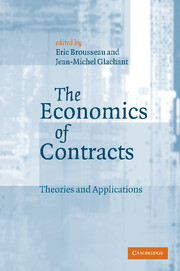Book contents
- Frontmatter
- Contents
- List of figures
- List of tables
- List of contributors
- Acknowledgments
- Part I Introduction
- Part II Contracts, organizations, and institutions
- Part III Law and economics
- Part IV Theoretical developments: where do we stand?
- 10 Transaction costs and incentive theory
- 11 Norms and the theory of the firm
- 12 Allocating decision rights under liquidity constraints
- 13 Complexity and contract
- 14 Authority, as flexibility, is at the core of labor contracts
- 15 Positive agency theory: place and contributions
- Part V Testing contract theories
- Part VI Applied issues: contributions to industrial organization
- Part VII Policy issues: anti-trust and regulation of public utilities
- Bibliography
- Index of names
- Subject index
12 - Allocating decision rights under liquidity constraints
Published online by Cambridge University Press: 16 January 2010
- Frontmatter
- Contents
- List of figures
- List of tables
- List of contributors
- Acknowledgments
- Part I Introduction
- Part II Contracts, organizations, and institutions
- Part III Law and economics
- Part IV Theoretical developments: where do we stand?
- 10 Transaction costs and incentive theory
- 11 Norms and the theory of the firm
- 12 Allocating decision rights under liquidity constraints
- 13 Complexity and contract
- 14 Authority, as flexibility, is at the core of labor contracts
- 15 Positive agency theory: place and contributions
- Part V Testing contract theories
- Part VI Applied issues: contributions to industrial organization
- Part VII Policy issues: anti-trust and regulation of public utilities
- Bibliography
- Index of names
- Subject index
Summary
Introduction
The debate on the foundations of incomplete contracts had focused essentially on the Grossman–Hart (1986) framework, in which actions (in that case, trade versus no-trade) are assumed to be ex ante non-describable but expost verifiable. This class of incomplete contracts models focuses on how ownership allocation affects ex ante investments through its impact on the ex post bargaining between the contracting parties; since actions are verifiable, this bargaining is always ex post efficient so that the main source of inefficiency lies in the non-verifiability of ex ante investments. In this framework, Maskin and Tirole (1999a) shows that message games played ex post can often be used to circumvent the ex ante non-contractibility and even the non-describability of actions and states. A main response to this criticism (see Segal 1999, Hart and Moore 1999a, Maskin and Tirole 1999b) has been to add renegotiation and complexity considerations, in order to generate optimal mechanisms that can be easily interpreted as ownership and control allocations.
Another set of incomplete contracting models, starting with Aghion and Bolton (1992), focuses instead on ex post inefficiencies resulting from the non-contractibility of actions, combined with additional limitations on the ability to induce ex post efficient action choice through adequate transfers to the controlling party.
- Type
- Chapter
- Information
- The Economics of ContractsTheories and Applications, pp. 193 - 212Publisher: Cambridge University PressPrint publication year: 2002



